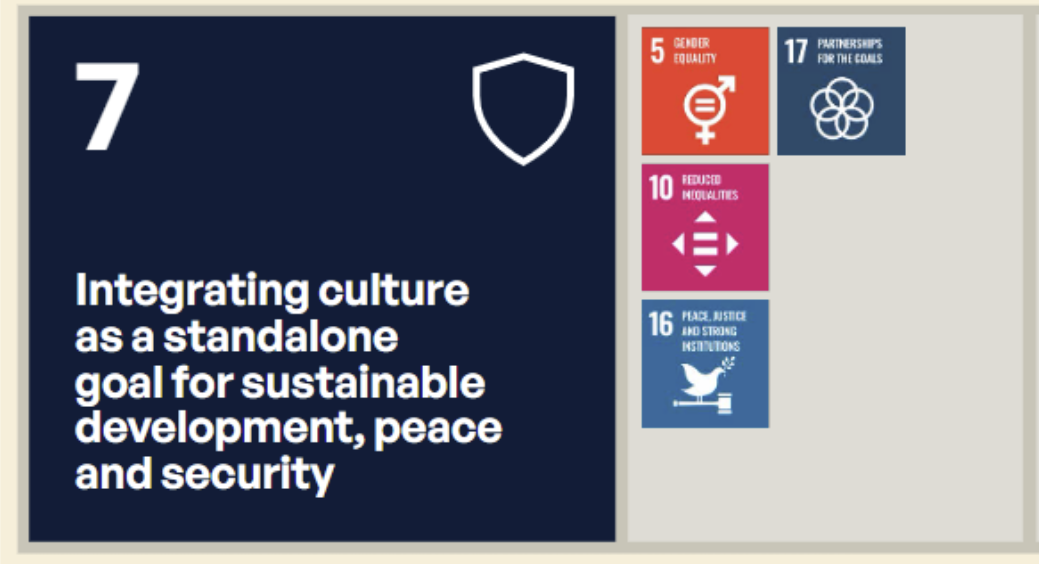‘UNESCO global report on Cultural Policies, Culture: the Missing SDG’ was presented in MONDIACULT 2025. The Report provides evidence on the ongoing proceedings, as 100 Ministers and more than 1200 CCS representatives are gathered in Barcelona debating on declaring Culture as a Sustainable Development Goal.
“Culture is not a peripheral sector to be supported, but a central force to be mobilized-and momentum is building worldwide” forewords Audrey Azouley, Director-General of UNESCO.
The publication sets a milestone as it inaugurates the quadrennial series of Global Reports on Cultural Policies, following Ministers’ calls in the MONDIACULT 2022 Declaration.
The Report finds cultural and creative industries representing 3.39% of global GDP and 3.55% of total employment, and cultural tourism across 250 cities generating $741.3 billion in 2023.
A growing recognition of the strategic role of culture is highlighted, as 93% of reporting Member States include culture as a key element in national sustainable development plans.
Along with the increasing "operationalization of cultural policy", disparities on cultural budgets persist as “per capita expenditure averages $418.56 in Europe and North America, representing almost thirteen times that of the rest of the world combined”.
Signaling a critical juncture among “political will, community leadership and data-driven insight” the Report argues that “Only a stand-alone goal can provide the visibility, coherence and ambition that the cultural field urgently requires”.
Structured on MONDIACULT 2022 six priority areas, the Report explores how culture advances rights, education, climate action and digital transformation to enhance resilience against today's crises. The conclusion strongly argues for "integrating culture as a standalone goal for sustainable development, peace, and security".
Culture is increasingly being operationalised in Public Policy
The Report, as the first global analysis encompassing all cultural domains, demonstrates an increasing trend of operationalising culture across public policy and funding strategies: “from urban regeneration to post-disaster recovery, from conflict prevention to digital access and cultural rights”.
It reveals that this “work remains fragile” as it happens “unevenly and often without adequate institutional support”.
Highlighted challenges include outdated institutional mechanisms, funding systems and regulatory frameworks, along with growing gender disparities, digital divides, and income inequality among digital creators, especially in the AI environment.
Data gaps and Cultural Budget Disparities
“Dialogue without data risks becoming symbolic; data without dialogue remains inert.” reads the report. It underscores persisting data gaps and the need to strengthen commitment and coordination for the development of culture data, since “without a multilateral and evidence-driven approach, it is challenging to develop clear and compelling financing models for culture”.
As suggested “the question is no longer whether culture belongs in sustainable development – but how it can be recognized, measured and resourced as a pillar of the next global agenda”.
AI and technological challenges could turn to innovation opportunities
From €6 billion in 2023, the value of the market for AI-generated audiovisual content, is estimated to reach €48 billion by 2028. Along with technological progress, there are associated risks, warns the Report, from “revenue loss for creators to concerns over intellectual property and, more broadly, the potential for cultural flattening”.
However, the digital realm bears a potential “to support, rather than undermine, innovation and creative expression”, if the conditions of “greater investment and attention” are met.
Six Priority Areas and Impact on Existing SDGs
Following and building on the MONDIACULT 2022 Declaration, the Report focuses on the following six priority areas, all arguing for Culture as a standalone Sustainable Development Goal, from a different perspective.
1 - Advancing inclusive and equitable participation in cultural life
2 - Leveraging digital technologies to reduce inequalities and stimulate innovation
3 - Fostering culture and arts education
4 - Enabling an inclusive and sustainable cultural ecosystem and driving economic development
5 - Tackling climate change and promoting environmental sustainability through culture
6 - Protecting artists and culture at risk and bolstering resilience, peace and security
The proposed SDG for culture as a total is presented to have an impact on existing SDGs, namely the SDGs: 5 - Gender Equality, 10 - Reduced Inequalities, 16 - Peace, Justice and Strong Institutions and 17 - Partnerships. The Report's provides a Framework with the links of all the six priorities on existing SDGs and on AU 2063 Goals.

Background
The Report was created gathering evidence during 2019-2024, following the MONDIACULT 2022 Declaration, where the Director-General of UNESCO was called to “produce a comprehensive Global Report on Cultural Policies on a quadrennial basis” that would serve the works of a “World Forum on Cultural Policies”, to be convening, every four years from 2025 onwards.
Find the report here
Image - Courtesy of the UNESCO Global Report on Cultural Policies, Culture: the Missing SDG.









